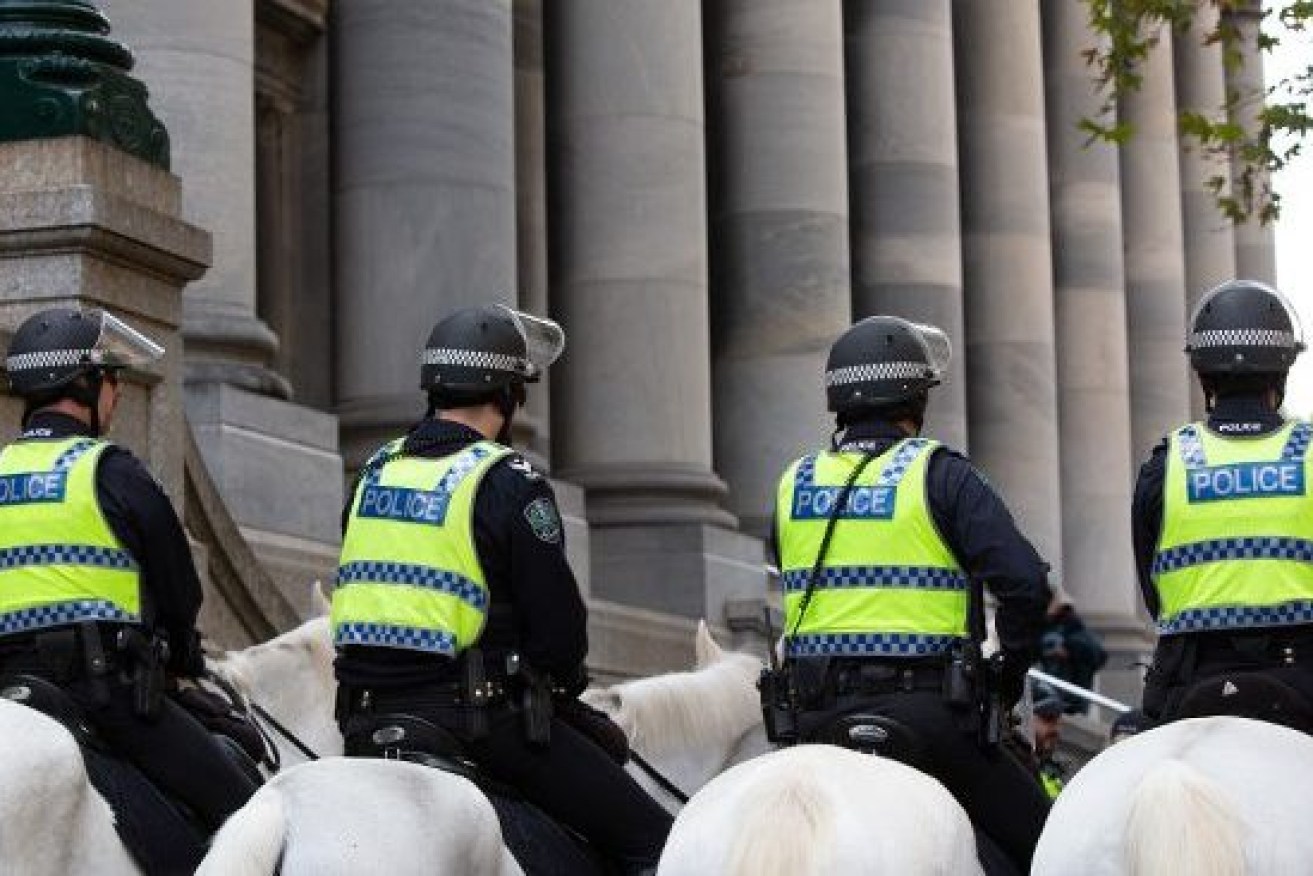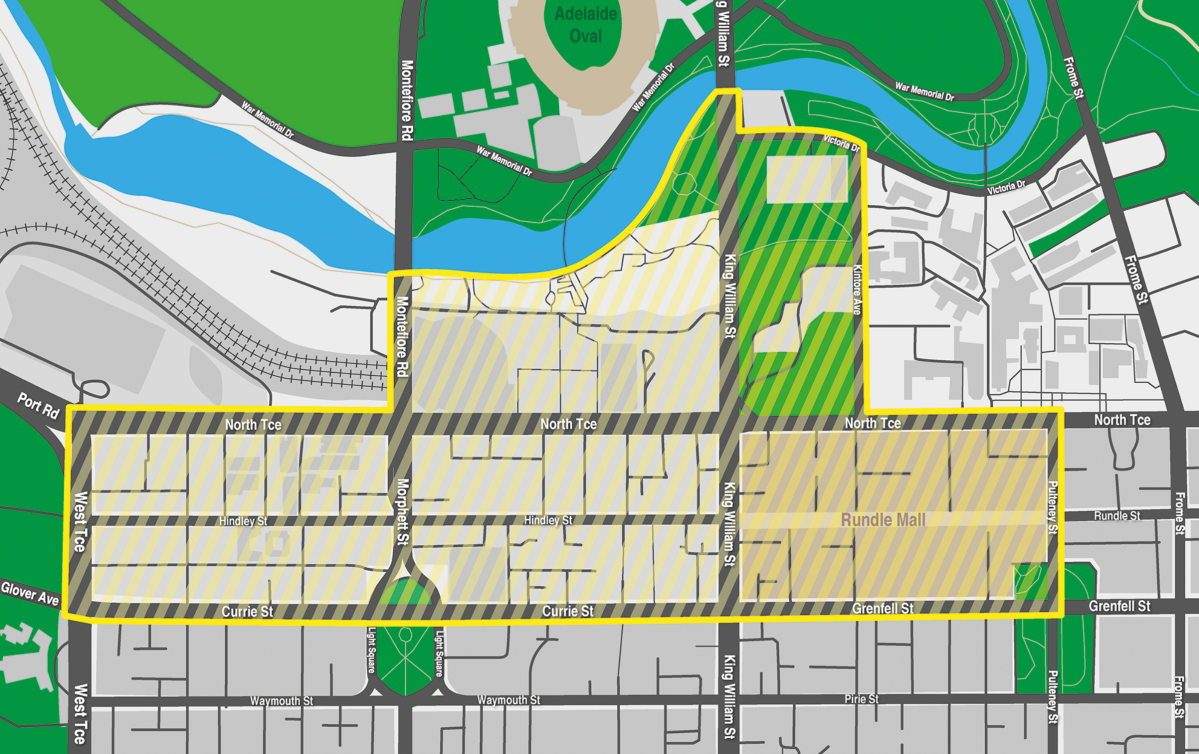CBD crackdown: Arrests, removals as police shift ‘anti-social’ problems
Police have removed 62 people from a Declared Public Precinct near Parliament House in the first week of expanded powers in the city – prompting one homeless services chief to call on the State Government to stop “shifting the problem”.


SA Police are cracking down on "anti-social" behaviour in a new precinct including North Terrace. Photo: Brett Hartwig/InDaily
Five people were also arrested under strict new police powers applying to the restricted city zone including North Terrace between July 11 and July 18, with seven expiation notices each worth $344 issued for behavioural offences.
SA Police confirmed 11 metal detector searches were conducted with no weapons found, under rules giving police the power to search, remove and ban people from an area encompassing most of the northern end of the Central Business District.
Assistant Commissioner Scott Duval said police are actively enforcing the Declared Public Precinct (DPP) – made four times larger than its previous Hindley Street zone – in the first week of the new declaration “which is contributing to reducing anti-social behaviour in the area”.
“Police acknowledge that whilst this is an effective enforcement strategy it is only one element of addressing the issue,” he said, adding that the force is working with other agencies to “provide services to people in need”.
But Human Services Minister Nat Cook’s office has confirmed that a new area in the western parklands with toilets and support services supposed to work alongside “Operation Paragon” by the end of this month will not be operating until “early August”.
Hutt Street Centre chief executive officer Chris Burns said the new rules and tougher policing are shifting social issues further out of public sight while failing to “fix the problem” of a housing crisis, rising inflation, mental health and drug and alcohol dependency.
He also questioned the announcement from the State Government that it is establishing the $490,000 site “to assist remote visitors” visiting Adelaide in the western parklands with cooking facilities, water, power and toilets.
“Why would you take indigenous people who are in the city out to an asphalt carpark on the side of Anzac Highway away from any public transport and away from any civilisation and say this is where you are living now?” Burns said.
“Who asked them where they wanted to go?”
Burns called on the state government to take more action to address the root causes of rising social issues.
“It is not our impression however that the issues in North Terrace are a homeless issue,” Burns said.
“Our impression is that a lot of the people along North Terrace for instance are already housed, however, they (police) are moving them out of the CBD and they will be going back to overcrowded homes that will give rise to its own problems.
“If you squeeze them out of the CBD all they will do is move people somewhere else, they will return to overcrowded housing in the suburbs or move to places in Glenelg or go and sleep in a car.”
The Law Society of South Australia also raised concerns about the “inherent dangers in expanding police powers in this way drastically, particularly for young people, transient people and Aboriginal people”.
“The hard reality of the relationship between disadvantaged people and law enforcement suggests that Aboriginal incarceration rates could rise significantly as a result of the expansion to the precinct regime,” the society’s president James Marsh said.
In an analysis of the new rules, he said without proper safeguards and services the regime “could result in rights being infringed while the underlying problems that lead to anti-social behaviour are merely shifted from one area to another”.

Police are cracking down in the new Declared Public Precinct zone covering the city’s cultural precinct and State Parliament on North Terrace. Photo: SA Police.
A spokeswoman for SA Police confirmed people deemed “anti-social” were being ordered to leave the new zone bordered by Grenfell and Currie Street, Pulteney Street, West Terrace, Montefiore Road, the River Torrens, Victoria Drive, Kintore Avenue and North Terrace.
In relation to arrests in the police precinct, police can now search any person for weapons, carry out drug detection, order people “posing a risk to public safety” to leave the area, ban a person from the precinct for up to 24 hours, and remove children at risk of physical harm.
People who are barred but enter or remain in the DPP can be fined $2500. Carrying weapons within the DPP can attract a penalty of up to $10,000 or imprisonment for up to two years.
Human Services Minister Nat Cook and Police Minister Joe Szakacs announced on July 9 that the Human Services Department was establishing “a safer place to gather in the western parklands for people from remote communities who are visiting Adelaide” and “with the aim of it being operational by the end of this month and continuing to early 2024”.
Szakacs said businesses and workers in the CBD “particularly in the North Terrace precinct, have been clear about recent anti-social behaviour and we are committed to addressing this”.
The park lands area is meant to have remote visitor support workers and drug and alcohol support on site, with a media release saying it would be backed by “culturally-led diversionary activities such as sport and music programs, and will also trial enterprise and employment pathways for remote visitors”.




